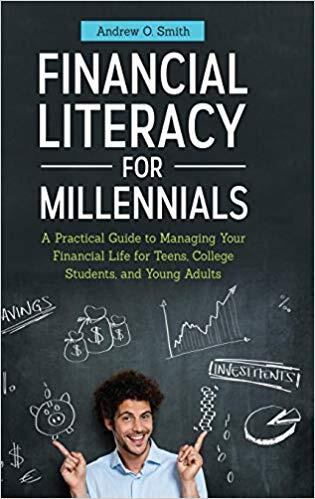Financial Literacy for Millennials
Review Financial Literacy for Millennials: A Practical Guide to Managing Your Financial Life for Teens, College Students, and Young Adults
by ANDREW SMITH
Description
Personal money management is for the age group 15-30 years old is the offering the book Financial Literacy for Millennials. Andrew Smith has this personal mission to teach the younger generation of becoming financially literate and responsible. The book touches details and practical insights to responsible financial management among the youth.
Smith gives an updated version of the conventional personal fiancé practices, which include budgeting, debt, credit, savings, investment, etc. He also delves into important financial decisions and personal growth practices like career planning, starting a business, internet fraud, and financial scams. The book goes beyond financial issues and also picks on basic taxing principles, avoiding bankruptcy, and legal issues millennials are confronted with.
If you are a millennial, improve your knowledge about your privileges, responsibilities, and financial accountabilities by reading this book.
About the Author
Andrew Smith is a multi-faceted individual serving as a financial advisor, trustee, and a licensed attorney who has served several financial firms like trust funds, estates, investment partnerships, insurance trusts, and private individuals.
Table of Contents
One: Financial Planning
Money, Inflation, Personal Responsibility, Life Goals
Two: Careers
Career Paths, Human Capital, Education, and Training
Three: Business and Entrepreneurship
Business Organization, The Language of Business, Startups, Franchises, Side Business, Real Estate
Four: Saving and Banking
Why Save? How To Save. Banking Basics. Bank Accounts. Automated Teller Machines.
Five: Budgeting and Spending
How To Budget. Everyday Spending. Savings and Emergencies. Sample Budget.
Six: Credit and Debt
Loans. Time Value of Money. Collateral and Repayment. Mortgages. Interest Rates
Seven: Bankruptcy
Why Bankruptcy? Types of Bankruptcy. Exempt Property.
Eight: Investments
Compounding. Understanding Risk. The Stock Market. Mutual Funds.
Nine: Avoiding Financial Scams
Pyramid Schemes. Other Investment Frauds. Identity Theft.
Ten: Insurance
How Insurance Works. Property Insurance. Title Insurance.
Eleven: Taxes
How Taxes Work. What Taxes Support. Sales Taxes. Income Taxes
Twelve: Government Benefits
Social Security. Medicare. Poverty.
Thirteen: Legal Issues
Contracts. Prenuptial Agreements. Liability. Property.
Fourteen: Growing Older Retirement Plans. Pensions. How Much Do You Need?
